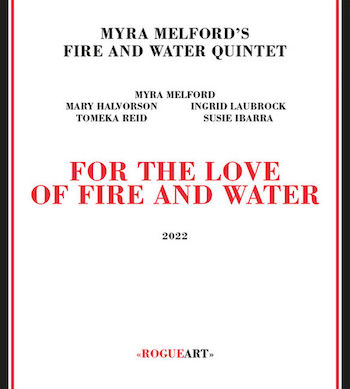Jazz Album Reviews: New Discs from Tomas Fujiwara’s Triple Double and Myra Melford’s Fire and Water Quintet
By Steve Feeney
These two superb new releases were both recorded at a former fire station in Connecticut.
Tomas Fujiwara’s Triple Double – March (Firehouse 12 Records)
Myra Melford’s Fire and Water Quintet – For the Love of Fire and Water (RogueArt)
I lived across from a small-town firehouse in my early teen years. Scrambling Three-Stooges-style volunteer training exercises, bean suppers served by big guys in aprons, and everyday heroism were among the place’s customary activities. Jazz should fit well with the setting’s residing spirit.
Two new releases were both recorded at a former fire station in Connecticut.

The first candidate from New Haven’s Firehouse 12 studio is a new release from Tomas Fujiwara’s sextet, called Triple Double. Made up of two drummers (Fujiwara, with a bit of his vibes thrown in, and Gerald Cleaver), two guitarists (Mary Halvorson and Brandon Seabrook), and two brass men (Ralph Alessi and Taylor Ho Bynum: trumpet and cornet, respectively), the album’s title, March, is apt — this recording captures an expressive band that is very much on the move.
And it is getting somewhere. Fujiwara advances ever closer to generating the sort of raucous lyricism that many of the better progressive composers long for. The energetic proceedings — six Fujiwara originals and one drums-only, co-composition — rumble and tumble as soloists engage with one another in duo, trio, and beyond passages.
“Pack Up, Coming For You” nimbly juxtaposes startling combinations of instruments. At first, the leader, Halvorson, and then Bynum let it all out: the guitarist simulates shivery static before the trumpeter begins a nervous solo above Fujiwara’s disciplined clatter. The piece gathers in all the band’s members for an abrupt close.
“Life Only Gets More” comes across as a kind of suspiciously genial reverie, with Halvorson floating above it all, adding her trademark bent notes. Reflective and a little spooky, the tune is content to wander.
“Wave Shake and Angle Bounce” brings in Seabrook for some collective jamming that reaches heavy metal proportions. Yet there’s something folkish about the piece’s theme. Unison horns and wacky guitar noodlings create thrilling sonic contrasts as the band’s ebullient collective identity prepares to swoop in.
“Docile Fury Ballad” is hyper-bop-fusion that wants to assert its effusive power — but a strangely discursive ebb holds it back. Alessi offers a stirring solo before the others charge on at the end.
“For Alan, Part II” is a seventeen-minute-plus drum duet in honor of the legendary Boston-based drummer/educator (and Fujiwara’s childhood teacher) Alan Dawson. It’s a lesson in spirit transcending technique as Cleaver and the leader come close to perpetuating a state of rhythmic Nirvana.
Though she’s been on the progressive music scene since the ’80s, composer/keyboardist Myra Melford seems to me one of the perpetually rising stars of jazz. I guess it’s because I always expect (and get) something fresh and challenging when a new release of hers arrives.
 Her new CD, For the Love of Fire and Water, reconfirms her talent for whipping up musical excitement without sacrificing complexity and sophistication. One might long for a bit more overt force in the performances, but there’s still much here to savor with delight.
Her new CD, For the Love of Fire and Water, reconfirms her talent for whipping up musical excitement without sacrificing complexity and sophistication. One might long for a bit more overt force in the performances, but there’s still much here to savor with delight.
It doesn’t hurt that this new disc of originals. recorded last summer at Firehouse 12, features a stellar, all-women quintet of illustrious creators from the outer reaches of the avant-garde. Joining Melford (piano and Melodica) are Mary Halvorson (guitar), Susie Ibarra (drums and percussion), Ingrid Laubrock (tenor and soprano saxophones), and Tomeka Reid (cello).
The eleven sections on the 44-minute album are designated by Roman numerals and we are told the pieces were inspired by the work of visual artist Cy Twombly. A musical version of gestural expressionism?
“I” begins with a Cecil Taylor-esque, grinding piano solo by Melford before Reid adds edgy scrapes to a very nervous soundscape. Ibarra enters with concentrated taps and rattles that respond to Reid’s now steadier pulse. Then Laubrock’s soprano joins the jumbled conversation, welcoming Halvorson as she sidles in with bent and warped single notes.
“IV” sets a mysteriously slow pace — a portent of struggles to come? Reid’s solo sets what turns out to be chamber jazz parameters, directing her odd harmonics toward Halvorson. “X” also mines a more concentrated realm of sound to good effect.
“VII,” the longest and perhaps best piece on the disc, ramps up pretty quickly with a Melford and Ibarra duet. Again, the obsessive turnarounds of pianist Cecil Taylor come to mind. A thematic line emerges that affords Halvorson an avenue for counterpoint that eventually gives way to some pointillistic rambles. When Laubrock enters on tenor we seem to be in some sort of abstract cabaret, with the instrumentalists trying to catch what turns out to be an illusive beat.
“IX” cuts loose for an extended bit of alarmed expressiveness. Hopefully, more of that cacophonous assertion will be on-call in the band’s next tour of duty at Firehouse 12.
Steve Feeney is a Maine native and attended schools in Maine, New Hampshire, and Massachusetts. He has a Master of Arts Degree in American and New England Studies from the University of Southern Maine. He began reviewing music on a freelance basis for the Portland Press Herald/Maine Sunday Telegram in 1995. He was later asked to also review theater and dance. Recently, he has added BroadwayWorld.com as an outlet and is pleased to now contribute to Arts Fuse.
Tagged: Firehouse 12 Records, For the Love of Fire and Water, March, Myra Melford, RogueArt, Tomas Fujiwara
